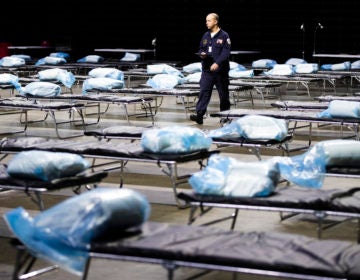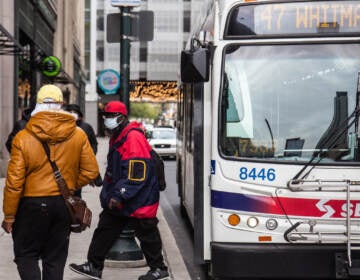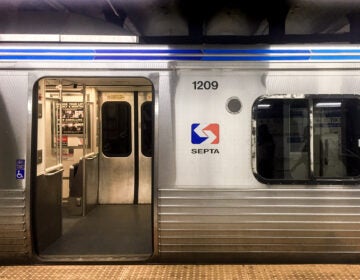SEPTA confirms 3 coronavirus deaths
The coronavirus pandemic has taken the lives of three Philadelphia transit workers. As of April 6, 48 SEPTA employees have tested positive for the virus.

A SEPTA bus driver wears a protective mask as he drives through Philadelphia, Wednesday, April 1, 2020. (AP Photo/Matt Rourke)
Three Philadelphia transit workers have succumbed to the coronavirus, SEPTA confirms.
The most recent employee fatality was Michael Holt, a bus operator from the Midvale Depot, who died Monday overnight, according to Transport Workers Union Local 234 president Willie Brown.
Phillip Williams of the Southern Depot died last week. Theodore Nixon from the Elmwood Trolley Depot was the first fatality, passing days earlier.
As of today, SEPTA spokesperson Andrew Busch reported 81 SEPTA employees have tested positive for the coronavirus
Last week, SEPTA implemented rear-door entry for riders and suspended on-board fare payment to encourage social distancing between riders and operators. They also limited the number of riders per vehicle, 20 for buses, 25 for trolleys.
The authority is also working to secure 10,000 face masks for its workforce, an infusion of protective gear needed to comply with best safety practices. They’ve also expedited the installation of protective shields on the trolleys for operators.
The changes came after Brown accused SEPTA of putting “profit over people,” having little regard for worker safety. The union president has since met with SEPTA general manager Leslie Richards as part of an ongoing dialogue to address worker concerns.
“They started out too slow,” said Brown. “We have been seeing changes, but it’s a little too late for some of our members who contracted the virus.”
SEPTA also implemented a series of service cuts as the authority experienced severe ridership losses due to the pandemic. More adjustments are likely as the virus continues to impact the workforce.
“We have to be prepared for whether or not we’re going to have to operate with fewer employees,” said SEPTA spokesperson Andrew Busch. “Obviously people are getting sick and they’re going to be out. So we’re going to have to look ahead and prepare for that.”
The CDC recently recommended people wear “cloth face coverings in public settings where other social distancing measures are difficult to maintain.” Mayor Jim Kenney warned Tuesday that there may come a point where people will be prohibited from boarding buses and trains without a face mask.
“I don’t know when that will be,” he said. “There are people dying in every sector and workforce.”
The disease is taking its toll on transit authorities nationwide as more workers test positive and deaths increase. As of April 6, New York City’s MTA, who also employs TWU members, reported 33 deaths, alone, while the Amalgamated Transit Union reported 11 of their members, including two retirees, died.
Both ATU and TWU recently joined forces and vowed to take strong action against transit agencies to gain better protection for their members, which totals more than 330,000 spread across the country.
“If transit agencies don’t take immediate and dramatic steps to protect our members, there will be serious consequences,” said TWU International President John Samuelsen in a press release.
Last week, SEPTA implemented rear-door entry for riders and suspended on-board fare payment to encourage social distancing between riders and operators. They also limited the number of riders per vehicle, 20 for buses, 25 for trolleys.
The changes came after Brown accused SEPTA of putting “profit over people,” having little regard for worker safety. The union president has since met with SEPTA general manager Leslie Richards as part of an ongoing dialogue to address worker concerns.
SEPTA is working to secure 10,000 face masks for its workforce, an infusion of protective gear needed to comply with best safety practices. They’ve also expedited the installation of protective shields on the trolleys for operators.
SEPTA also implemented a series of service cuts as the authority experienced severe ridership losses due to the pandemic. More adjustments are likely as the virus continues to impact the workforce.
“We have to be prepared for whether or not we’re going to have to operate with fewer employees,” said SEPTA spokesperson Andrew Busch. “Obviously people are getting sick and they’re going to be out. So we’re going to have to look ahead and prepare for that.”
WHYY is your source for fact-based, in-depth journalism and information. As a nonprofit organization, we rely on financial support from readers like you. Please give today.





![CoronavirusPandemic_1024x512[1]](https://whyy.org/wp-content/uploads/2020/03/CoronavirusPandemic_1024x5121-300x150.jpg)



